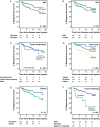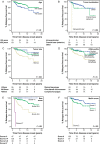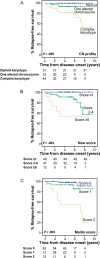Proposal for a new risk stratification classification for meningioma based on patient age, WHO tumor grade, size, localization, and karyotype
- PMID: 24536048
- PMCID: PMC3984558
- DOI: 10.1093/neuonc/not325
Proposal for a new risk stratification classification for meningioma based on patient age, WHO tumor grade, size, localization, and karyotype
Abstract
Background: Tumor recurrence remains the major clinical complication of meningiomas, the majority of recurrences occurring among WHO grade I/benign tumors. In the present study, we propose a new scoring system for the prognostic stratification of meningioma patients based on analysis of a large series of meningiomas followed for a median of >5 years.
Methods: Tumor cytogenetics were systematically investigated by interphase fluorescence in situ hybridization in 302 meningioma samples, and the proposed classification was further validated in an independent series of cases (n = 132) analyzed by high-density (500K) single-nucleotide polymorphism (SNP) arrays.
Results: Overall, we found an adverse impact on patient relapse-free survival (RFS) for males, presence of brain edema, younger patients (<55 years), tumor size >50 mm, tumor localization at intraventricular and anterior cranial base areas, WHO grade II/III meningiomas, and complex karyotypes; the latter 5 variables showed an independent predictive value in multivariate analysis. Based on these parameters, a prognostic score was established for each individual case, and patients were stratified into 4 risk categories with significantly different (P < .001) outcomes. These included a good prognosis group, consisting of approximately 20% of cases, that showed a RFS of 100% ± 0% at 10 years and a very poor-prognosis group with a RFS rate of 0% ± 0% at 10 years. The prognostic impact of the scoring system proposed here was also retained when WHO grade I cases were considered separately (P < .001).
Conclusions: Based on this risk-stratification classification, different strategies may be adopted for follow-up, and eventually also for treatment, of meningioma patients at different risks for relapse.
Keywords: SNP arrays; iFISH; meningioma; recurrence; risk stratification.
Figures




References
-
- Mawrin C, Perry A. Pathological classification and molecular genetics of meningiomas. J Neurooncol. 2010;99:379–391. - PubMed
-
- Marosi C, Hassler M, Roessler K, et al. Meningioma. Crit Rev Oncol Hematol. 2008;67:153–171. - PubMed
-
- Yew A, Trang A, Nagasawa DT, et al. Chromosomal alterations, prognostic factors, and targeted molecular therapies for malignant meningiomas. J Clin Neurosci. 2013;20:17–22. - PubMed
-
- Stafford SL, Perry A, Suman VJ, et al. Primarily resected meningiomas: outcome and prognostic factors in 581 Mayo Clinic patients, 1978 through 1988. Mayo Clin Proc. 1998;73:936–942. - PubMed
Publication types
MeSH terms
LinkOut - more resources
Full Text Sources
Other Literature Sources
Medical
Molecular Biology Databases

